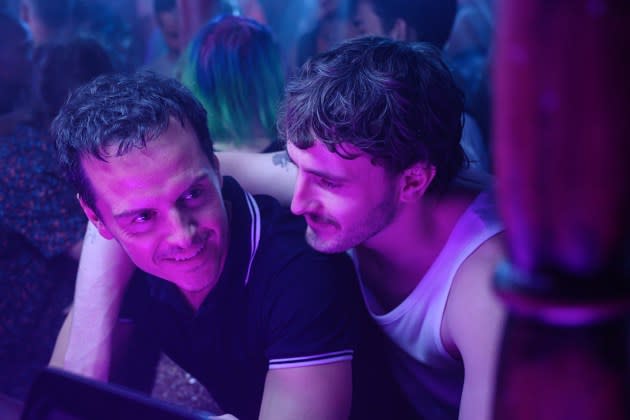Telluride Awards Analysis: ‘All of Us Strangers’ Script and Star Could Find Support

All of Us Strangers, a tearjerking supernatural drama written and directed by Andrew Haigh (Weekend, 45 Years and HBO’s Looking), had its world premiere at the Telluride Film Festival on Thursday and then screened again on Saturday at the Werner Herzog Cinema. Adapted from Taichi Yamada’s 1987 novel but altered by Haigh into a story more personal to him, the film — which Searchlight will release on Dec. 22 — wowed critics but may prove a slightly tougher sell to Academy members. They do occasionally embrace supernatural stories (see: The Shape of Water and Everything Everywhere All at Once), but seem to prefer examples of the genre that leave fewer questions unanswered.
Strangers’ strongest shots at awards season recognition are probably Haigh’s screenplay and the performance of the film’s leading man, Andrew Scott (aka “the hot priest” from season two of Amazon’s Fleabag), which is quiet and soulful but makes a major impression.
More from The Hollywood Reporter
Andrew Scott Says He Wouldn't Want to Be a Bond Villain Again: "I Know Who I Am"
British Independent Film Awards: 'Rye Lane,' 'Scrapper,' 'All of Us Strangers' Lead Nominations
'Spider-Man: Across the Spider-Verse' Creative Team to Receive Award from Denver Film Festival
Scott plays a London-based screenwriter who lost his parents to a car crash when he was 12. When, decades later, he decides to visit his old neighborhood, he finds them seemingly alive and going about their business at the same age they were when they died. On that visit and other visits that follow, he shares with them information about his life — most notably that he is gay — and finds some degree of catharsis, all while simultaneously embarking on a new relationship with the only other inhabitant of the new apartment building in which he lives (Paul Mescal).
If this sounds like an episode of The Twilight Zone or Black Mirror or reminds you to a degree of films like Back to the Future or Field of Dreams, you are not alone. But what elevates it to something unique and special is the degree to which Haigh’s script and Scott’s performance capture the ache of grief and the desire for parental acceptance that is pretty much universal. As noted in many reviews of the film, however, it may be particularly felt by generations of LGBTQ people whose parents struggled to accept them for who they are.
Best of The Hollywood Reporter

 Yahoo News
Yahoo News 